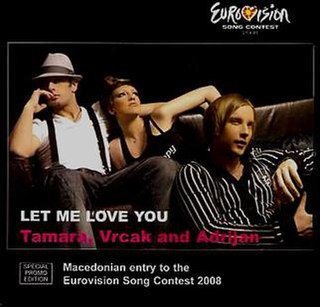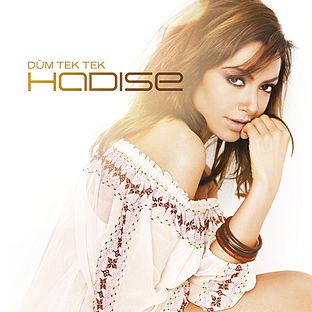Timur Selçuk was a Turkish singer, pianist, conductor and composer.

Croatia has participated in the Eurovision Song Contest 26 times since making its debut at the 1993 contest. Their entry has since 1993, excluding from 2012 to 2018, been selected at the Dora pop festival, an event organised by the national public broadcaster Croatian Radiotelevision (HRT). Croatia's best result in the contest is a fourth-place finish in 1996 and 1999.

"La, la, la" is a song recorded by Spanish singer Massiel, written by Manuel de la Calva and Ramón Arcusa. It is best known as the Spanish winning entry at the Eurovision Song Contest 1968 in London. It was the first time that Spain won the Contest. Massiel also released the song in English as "He Gives Me Love ".

"Laat me nu gaan" was the Belgian entry in the Eurovision Song Contest 1985, performed in Dutch by Linda Lepomme.

"Door de wind" was the Belgian entry in the Eurovision Song Contest 1989, performed in Dutch by Ingeborg. It was composed by Dutch singer-songwriter Stef Bos, initially for his mother who suffered from cancer at the time.
Ohannes Tunçboyacı, better known as Onno Tunç, was a leading Armenian-Turkish musician, working mainly as a composer, arranger and a music producer. Tunç also played bass guitar and occasionally double bass, contributing to the albums of several musicians. He was one of the prominent names of Turkish pop music in the 1980s and 1990s with his arrangements. He was the elder brother of musician Arto Tunçboyacıyan.

"Ne brini" was the Bosnian entry in the Eurovision Song Contest 2003, performed in Bosnian and English by Mija Martina.
The song was performed sixth on the night, following Malta's Lynn with "To Dream Again" and preceding Portugal's Rita Guerra with "Deixa-me sonhar". At the close of voting, it had received 27 points, placing 16th in a field of 26. Mija managed to earn Turkey's maximum, 12 points accumulated into her final score.

"The Real Me" was the Ireland entry in the Eurovision Song Contest 1989, performed in English by Kiev Connolly and The Missing Passengers.

"Blijf zoals je bent" was the Dutch entry in the Eurovision Song Contest 1989, performed in Dutch by Justine.

"Ik wil alles met je delen" was the Dutch entry in the Eurovision Song Contest 1990, performed in Dutch by Maywood. The English-language version was entitled "No more winds to guide me".

"Let me Love you", is a song by Tamara Todevska, Vrčak and Adrian Gaxha. The trio competed with the song at Skopje Fest 2008. The song won, having been awarded the most televotes by the general public and the 7-member expert jury. The English language version represented Republic of Macedonia at the 2008 Eurovision Song Contest in Belgrade, Serbia, on 22 May 2008. It was performed at number eighteen, following Evdokia Kadi's "Femme Fatale" and preceding Vânia Fernandes' "Senhora do mar " but did not acquire enough points to proceed to the final stage of the competition. It was voted the 10th qualifier by the televote, but the juries chose Sweden to pass.
Ayşegül Aldinç is a Turkish singer and actress.

"Düm Tek Tek" is a song by Belgian-Turkish singer Hadise that was performed as the Turkish entry for the Eurovision Song Contest 2009 in Moscow, Russia.

"Sufi" was the Turkish entry in the Eurovision Song Contest 1988, performed in Turkish by MFÖ.
Arzu Ece is a Turkish singer, best known for her participation in the Eurovision Song Contests of 1989 and 1995.
Belgium was represented by Philippe Lafontaine, with the song "Macédomienne", at the 1990 Eurovision Song Contest, which took place in Zagreb on 5 May. Lafontaine was chosen internally by broadcaster RTBF to be that year's Belgian representative.

Seyyal Taner is a Turkish singer and actress.

"Hold Me" was the song that represented Azerbaijan in the Eurovision Song Contest 2013. It was performed by singer Farid Mammadov. It came in second place. Mammadov released the Turkish version of the song called "Bana Dönsen" on 2 May 2013, which he said he dedicated to his fans in Turkey in light of Turkey's refusal to participate in the contest in 2013.
Turkey took part in the Eurovision Song Contest 1989. The country was represented by a music group named Pan with the song “Bana Bana” written and composed by the Timur Selçuk.
Demet Sağıroğlu is Turkish pop music singer.













